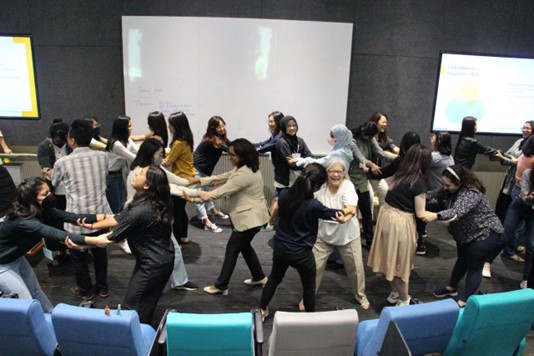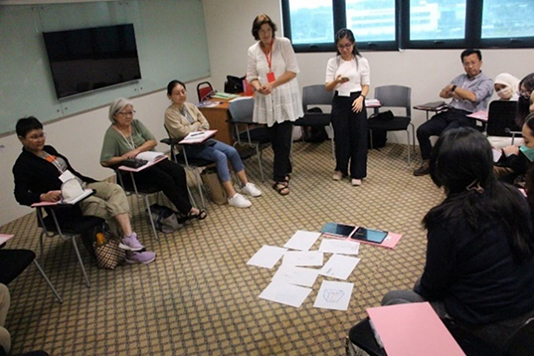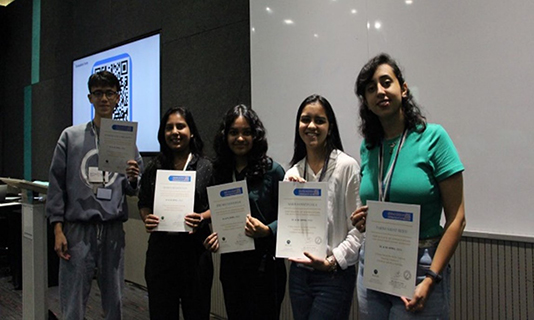You are here
Trauma Skills Training For Mental Health Professionals And Psychology Students At APU
Traumatic experience affects people of all ages in ways that disrupt their capacity to work, study, play, and generally function in their day-to-day lives. People often have nightmares, flashbacks, and ongoing fears about traumas that are known and unknown to them.

Mental health professionals from across the nation embarked on the two-day hands-on skills training on Treating Trauma in Children, Adults and Families held on 1 & 2 April 2023 at the Centre for Psychology and Wellbeing, APU.
This training was organized by Silver Lining Psychology Services and co-hosted by the APU Psychology Society and School of Psychology and drew 40 counsellors, psychologists, psychotherapists, medical doctors and our psychology students.
The team of expert trainers consisted of Dato Dr. Lai Fong Hwa (Psychiatrist), Ms. Loh Sit Fong (Clinical Psychologist), Ms. Silviana Bonadei (Special Educator), and our very own Psychology lecturer, Mr. Jaff Choong Gian Yong.
This training provided attendees with the skills and tools that will enable them to better engage clients through a trauma-informed lens. Such training focuses on understanding how someone who has experienced complex trauma can be triggered, processes, intakes, and deciphers information.
Understanding how to support students and peers to form secure relationships is vitally important in establishing healthy connections and facilitating effective engagement as well as creating a trauma-sensitive institution that can provide transformational equity for all.
Apart from the analysis of symptoms, diagnosis, risk factors, and epidemiology in dealing with trauma, there were also four practical workshop sessions which were divided according to the symptoms of trauma: 1) Dealing with Intrusion, 2) Dealing with Arousal, 3) Dealing with Avoidance, and 4) Dealing with Cognition.

This training was also beneficial in fostering collaborations with industry specialists in the field of psychology and can serve as an opportunity for future partnerships and internship opportunities for our APU Psychology students.
In fact, during the two days, the academic team from the School of Psychology were able to demonstrate some of the technology used in our curriculum such as the EEG and Eye Tracker machines to the attendees who were mental health and health practitioners from the industry who were genuinely impressed by the use of technology for psychology.
“The machines are advanced and I believe they will surely be helpful to all mental health patients. I hope APU and the team can conduct more research and provide some training for practitioners on how to fully utilize these machines in helping our clients,” said Dato Dr. Lai Fong Hwa.
In conclusion, the opportunity to co-host this trauma skills training was a huge success! The knowledge and skills gained significantly benefitted the mental health professionals as well as provided scenario-based learning exposure for our staff and students from the School of Psychology.
Here are some of the participants’ feedback –
“The 2-days trauma skill workshop has been an insightful experience, enlightening, packed with useful information and practical intervention tools.” Ms. Emily Octavia Mathius, APU Counsellor.
“I thoroughly enjoyed and learned so much as it was a hands-on, thought-provoking training that left me inspired; feeling much more influential with the tools and resources as takeaways that I can apply immediately!” Ms. Dhevaania C. Gendsen, Psychology Lecturer.
“From the trauma workshop, I learned a lot of valuable skills and techniques to use when handling people who are traumatized. One example of a technique I learned is not to give advice right away, it is important to actively listen and validate their feelings and calm them down before trying to advise them.” Kiarha Rubbinunan, Year 2 Psychology Student.
“The most rewarding to me through the workshop is I have a chance to explore what I’ve learned in the text and able to apply it through the practical training. It’s enhanced my confidence and I’ve decided to explore more in the field.” Edmond Chua Wei Hong, Year 1 Psychology Student.



